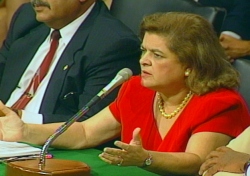"We Face a Constitutional Crisis Today
in Puerto Rico."
"While 95 percent of the governed people of Puerto Rico in 1993 voted in favor of permanent union between Puerto Rico and the United States, and irrevocable U.S. citizenship, 51 percent, a majority, voted for a relationship other than the current one. Therefore, our present form of government is not founded on the consent of the governed.
"All we are asking is for two things. One, that you authorize a nonbinding referendum process based on options which Congress is willing to consider as a basis for resolving the ultimate status of Puerto Rico. And two, that you define the available options so that the American citizens of Puerto Rico know precisely what it is they're voting for."Jose A. Fuentes-Agostini, Attorney General, Puerto Rico, July 15, 1998
|
This is a key moment for Congress to bear down on the Puerto Rico question, which has troubled Americans through the full 100 years since the United States seized the island from Spain. The now nearly 4 million residents are American citizens but are denied the full political rights of citizens in the 50 states. They sacrifice for the nation in war but have no vote in the government that makes their national laws. Gentle as the denial of rights may now seem, it is
still fairly described as colonialism. Speaker Newt Gingrich was on the mark when he said earlier this year of Puerto Rico, "I just think personally that to keep a colony is a very dangerous idea in the 21st century." The Washington Post, Editorial, 7/18/98
With the country's status again at the forefront of national debate, and with both statehood and independence advocates in support of an election, the Senate should move toward authorizing a plebiscite for the Puerto Rican people. Albuquerque Journal, Editorial, 7/17/98
Puerto Rico has been a part of the United States for a century. Puerto Ricans are loyal citizens, and they deserve a vote on statehood. If the majority votes "yes," Puerto Rico deserves quick admission to the Union. Sun-Sentinel, Editorial, 7/9/98
[F]airness suggests that the decision to grant a self-
determination vote be debated on its own merits. After 100 years as a U.S. possession - and if the options are fairly presented and clearly explained - Puerto Rico should be well-equipped to respond intelligently. The Plain Dealer, Editorial, 7/8/98
|

"The bills you are considering provide the mechanisms for us to finally attain political and economic parity with free peoples everywhere. Both contain three elements critical to accomplish these results: one, Puerto Rico is a territory of the United States; two, United States citizenship conferred by statute on Puerto Ricans is not constitutionally protected; and, three, the process to full determination and full self-government must continue until such time as we choose a permanent status, which is either independence or statehood." Dr. Miriam Ramirez de Ferrer, July 14, 1998.
Resolving Puerto Rico's Political Status
The record before Congress is now clear that permanent union and irrevocable U.S. citizenship can not be obtained through commonwealth, even if it is reformed as proposed in the 1993 commonwealth definition. Since only statehood provides the constitutionally guaranteed status and citizenship included in the commonwealth definition, the real question arising from the 1993 referendum results is how those who voted for commonwealth with permanent union and irrevocable U.S. citizenship intend to achieve that result if not through statehood.
"We will be repeating the mistakes of 1952 if we do not inform the people of Puerto Rico that individual U.S. citizenship is protected under commonwealth for the individual to whom it is already granted against arbitrary loss, regulation or restriction, but that the conferral of U.S. citizenship in the future is discretionary and could be withdrawn."
|

